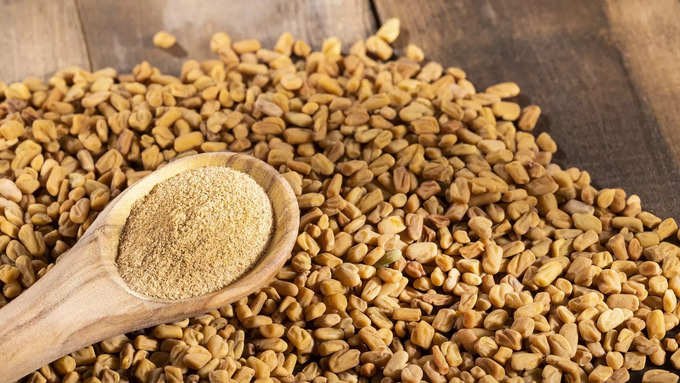How does fenugreek seeds affect diabetes?

Fenugreek seeds (trigonella foenum graecum) are high in soluble fiber. It helps lower blood sugar by slowing digestion. Also absorbs carbohydrates. Several clinical trials have shown that fenugreek seeds can improve diabetes. Metabolic symptoms are associated with both type 1 and type 2. In humans by lowering blood glucose levels Diabetes Improves glucose tolerance.
Benefits of taking fenugreek for diabetic patients

Diabetics were found to have significantly reduced blood glucose levels when they included 100 grams of fenugreek seeds in their daily diet. Also found to be reductions in glucose tolerance and total cholesterol LDL, the bad cholesterol, and triglycerides.
Another study found that adding 15 grams of fenugreek powder reduced postprandial growth in patients with type 2 diabetes. A separate study on the effects of food on blood glucose found that 2.5 grams twice daily for three months reduced blood sugar levels. The subjects in this study were type 2 patients without severe hypoglycemia.
How can diabetic patients take Fenugreek?

Soaking fenugreek is common. Can be beneficial. Take 10 grams of fenugreek and soak it overnight and take it as a tea in the morning on an empty stomach. The benefits of fenugreek are fully available when taken in the morning on an empty stomach.
Fenugreek seeds help improve insulin sensitivity. Insulin sensitivity refers to how the body’s cells respond to insulin. If these are saturated, the body’s cells use more glucose, causing blood sugar levels to drop. or under control.
Diabetic patients take fenugreek to slow gastric emptying

Gastric emptying refers to the time it takes for food to pass after a person has taken a meal. Postprandial spikes can increase blood sugar levels in diabetics when the stomach empties faster. It causes many problems in the stomach and intestines.
When fenugreek seeds are added it can control the fast emptying of the stomach. This prevents rise in blood glucose levels after meals.
Fenugreek Benefits Improve Insulin Sensitivity

In a person with diabetes, the body does not produce enough insulin or cannot use it effectively. This can increase the blood sugar level. This can cause serious problems over time.
Kidney disease
heart disease
Loss of vision
Diabetics have high glucose levels in the gut and an increase in sodium and glucose-transporting proteins can lead to high blood sugar levels. Fenugreek can reduce the absorption of high glucose levels. Also eating fenugreek seeds can help reduce the risk of hypoglycemia.
Is fenugreek safe to use when diabetes is under control?

Fenugreek is generally safe for use by people with diabetes or high cholesterol. Disadvantages: The side effects are not much detected. Fenugreek seeds contain fiber and other nutrients that help control blood sugar by lowering it. The body needs to improve insulin sensitivity to use sugar. These fenugreek seeds will do a lot of good for that.
Diabetics can add fenugreek seeds while taking insulin. It slows sugar absorption and stimulates insulin secretion. Both of these lower blood sugar in diabetics.
Diabetic patients can take fenugreek sprouts?

Fenugreek is beneficial no matter how you take it. Sprouts are considered the best form of fenugreek. It contains 30-40% more nutrients than soaking the seeds. The nutritional content of fenugreek seeds increases when they are germinated. Eases digestion. Sprouted fenugreek seeds reduce glucose absorption. Enhances pancreatic beta cell production.
Fenugreek powder helps in controlling and keeping blood sugar level. Supports digestion and improves lipid levels.
Things to be observed while taking fenugreek in diabetic patients..!

Pregnant women – Fenugreek can be added to the diet. But don’t add it alone even if you personally have diabetes. It can induce uterine contractions or labor.
Children – Fenugreek tea should not be given to small children. It causes diarrhea.
Fenugreek should not be used by cancer patients and those undergoing hormone therapy, especially breast or prostate cancer treatment.
Fenugreek should not be used even if the blood sugar level is low due to diabetes. It further lowers blood sugar. So people using insulin and other diabetes medications should be cautious.
Fenugreek should not be used by people with bleeding disorders. It increases anticoagulant properties. Especially herbs and medicines can have an effect.
Fenugreek may trigger asthma symptoms in people with breathing problems.
high blood pressure Those who have it should avoid fenugreek leaves. They are high in sodium and can raise blood pressure.








